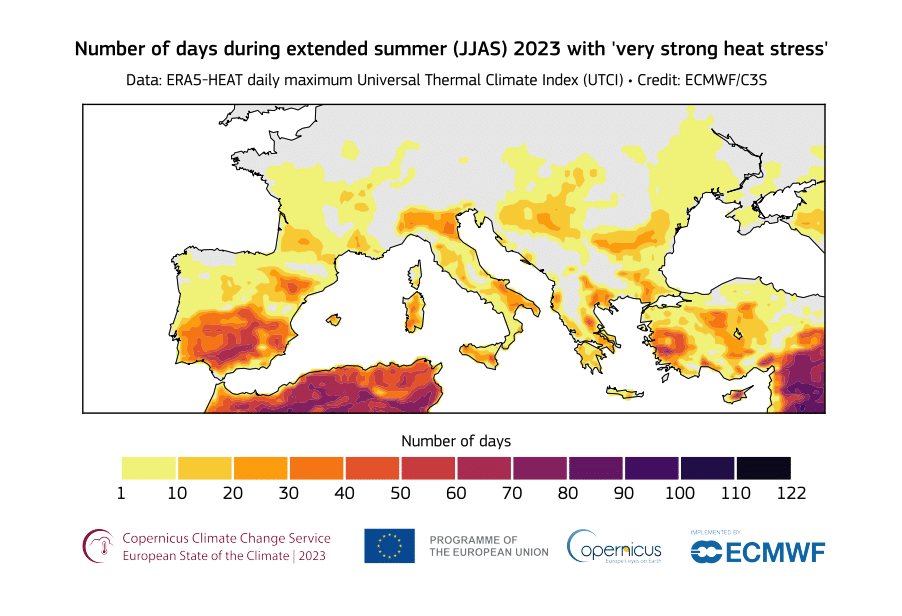Europe saw a record number of days with “extreme heat stress” and temperatures above average for 11 months in 2023, according to a new study.
—
Climate change is in full swing in Europe, according to new data shared on Monday.
Compiled by the Copernicus Climate Change Service (C3S) and the World Meteorological Organization (WMO), the latest European State of the Climate report paints a stark picture of the effects of global warming on the continent.
Extreme Heat
According to the joint report, 2023 was Europe’s joint warmest or second-warmest year on record, depending on the dataset. The world’s fastest-warming continent saw above-average temperatures for 11 months last year and 7% more precipitation than average. September went down in history as the warmest on record, with temperatures 2.51C higher than the 1991-2020 average and 1.1C higher than the previous warmest September recorded in 2020.
Heatwaves are spreading rapidly across the world, affecting billions of people, with an increasing number of studies pointing at climate change as a driving factor. According to the Intergovernmental Panel on Climate Change (IPCC), with further global warming, we can expect an increase in the intensity, frequency and duration of heatwaves. Extreme heat impacts human health – particularly affecting vulnerable categories including the elderly and infirm, pregnant women, infants, outdoor workers, and athletes. It also compromises water and food resources and threatens both terrestrial and marine ecosystems.
Europe is no exception when it comes to the consequences of climate change. The continent experienced a record number of “extreme heat stress” days in 2023. C3S and WMO data also suggests that heat-related mortality in the continent, which is warming twice as fast as any other continent, has increased by around 30% in the past two decades, while heat-related deaths are estimated to have increased in 94% of the European regions monitored.

Hot and dry conditions fuelled large wildfires across the region last year, which killed 44 people. Mediterranean regions such as Portugal, Spain, Italy, Greece, and Turkey were particularly affected. Other climate change-related extreme weather events such as storms and floods claimed an additional 99 lives, according to the joint report. Total economic losses for 2023 are estimated at more than €13.4 billion (US$14.3 billion).
Snow was scarce in much of Europe in winter and spring, owing to a milder-than-average winter. The Alps experienced “exceptional” glacier ice loss, losing 10% of their remaining volume between 2022 and 2023.
“The climate crisis is the biggest challenge of our generation. The cost of climate action may seem high, but the cost of inaction is much higher. As this report shows, we need to leverage science to provide solutions for the good of society,” said WMO secretary-general Celeste Saulo.
You might also like: Snow in Peril: The Impact of Climate Change on Ski Resorts in the Pyrenees
Warming Oceans
Besides record surface temperatures, European sea surface temperatures also reached their highest levels last year.
In July, the Atlantic Ocean west of Ireland and around the UK was hit by a marine heatwave classified as “extreme” and even “beyond extreme” in some areas, with temperatures as much as 5C above average. In the same month, the Mediterranean sea’s surface temperature hit its highest median recording since at least 1982 – 28.7C (83.7F). The Mediterranean – one of the world’s most diverse habitats for marine life, home to more than 17,000 species – is warming 20% faster than the global average – adding pressure to already strained ecosystems. A WWF study even suggests that the Mediterranean is becoming the “fastest-warming and the saltiest sea on our planet.”
“In 2023, Europe witnessed the largest wildfire ever recorded, one of the wettest years, severe marine heatwaves and widespread devastating flooding. Temperatures continue to increase, making our data ever more vital in preparing for the impacts of climate change,” said C3S director Carlo Buontempo.
Featured image: Utku Kuran.
This story is funded by readers like you
Our non-profit newsroom provides climate coverage free of charge and advertising. Your one-off or monthly donations play a crucial role in supporting our operations, expanding our reach, and maintaining our editorial independence.
About EO | Mission Statement | Impact & Reach | Write for us




















